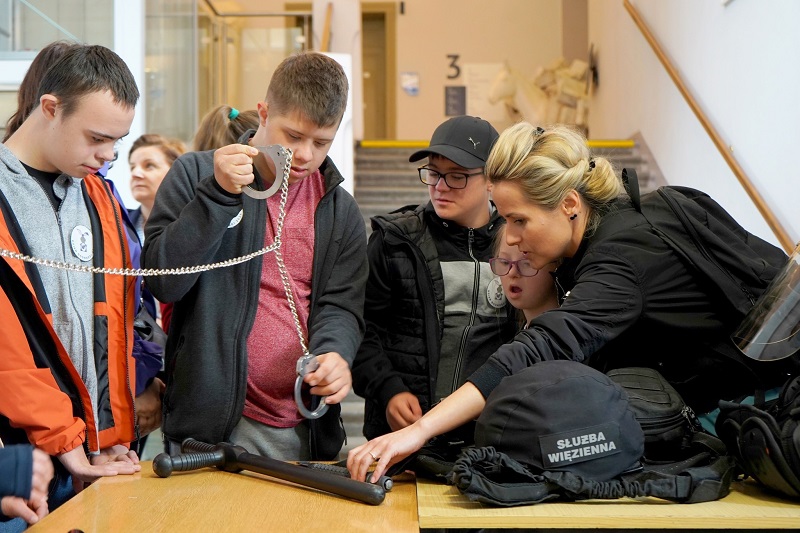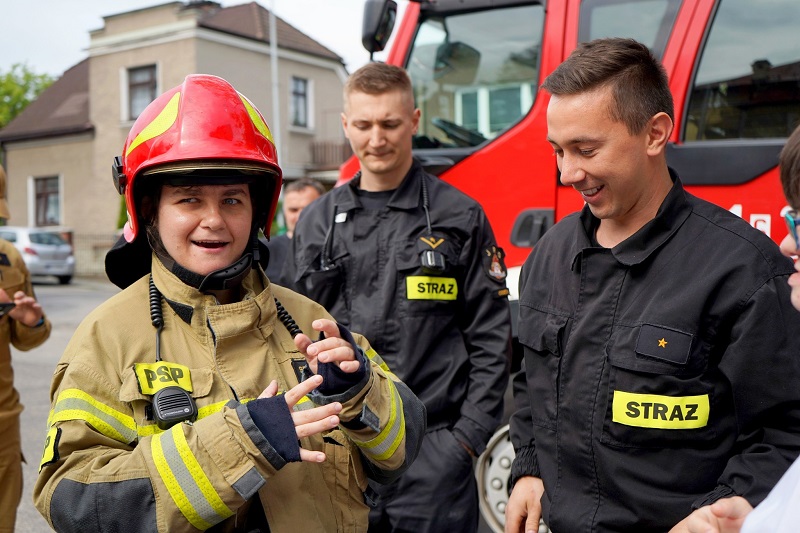People with disabilities form a diverse group, some of whom experience intellectual disabilities. Nowadays, there is more and more talk about social inclusion. The world, including Poland, is becoming more open to people with disabilities and including them.
Contact
Dorota Prysak, PhD from the Institute of Pedagogy, Faculty of Arts and Educational Science of the University of Silesia – dorota.prysak@us.edu.pl
| Written by: Olimpia Orządała |
The World Health Organisation estimates that there are 1.3 billion people with disabilities worldwide, representing 16% of the total population. According to Eurostat, people with disabilities account for 27% of the EU population over the age of 16 and 24% in Poland. These figures are continuously rising, which is why it is so important to support people with disabilities, improve their quality of life, and educate society, including future teachers.
Participation of uniformed services in the Day of Dignity for People with Disabilities at the University of Silesia has become quite a tradition | Photo: Konrad Matinyarare
People with disabilities form a diverse group. Some of them experience intellectual disabilities. Dorota Prysak, PhD from the Faculty of Arts and Educational Science of the University of Silesia in Katowice, successfully combines her work in academia with teaching in a school for students with special educational needs.
Nowadays, social inclusion becomes an increasingly frequent topic of discussion. The world, including Poland, is becoming more open to people with disabilities and tries to include them in social life. Much has changed in terms of architectural accessibility over the past decade or so: the installation of wheelchair ramps and suitably wide lifts could serve as examples. It is the mental barriers in society that prove to be the most difficult.
‘Maria Grzegorzewska, the pioneer of special education in Poland, emphasised the potential of people with disabilities. Her most often quoted words are: “There is no cripple, there is a human being”. I was taught, and so I also teach this to others, that in order to support people with disabilities we must first get to know them, understand their perspective, find out what challenges they face, and learn about the environment in which they function on a daily basis. Only then can we make suggestions tailored to their individual needs’, says the USil scientist. ‘Nowadays, we are increasingly often talking not about disabilities but about people with different developmental and educational needs. This view is particularly close to my heart, as I believe that every single person has needs, we just have to create a space where we can meet, get to know each other, and feel safe.
Teachers who work with people with disabilities, as well as academics training future special education teachers, social workers, and residential home staff, play an important role in social inclusion. They often work not only in kindergartens and schools but also in the local communities of people with disabilities.
It’s safe to say that some of us probably don’t know how to behave around people with intellectual disabilities. Often such people may seem too upfront to us, causing us to avoid them. Meanwhile, as the researcher believes, we can learn a lot from them. Their world is simple, and a zero-sum approach can help us organise our thinking a little better. In turn, their honesty opens the way for us to become more authentic as well.
‘A lot depends on ourselves and what kind of people we are and what kind of value system we have. Nothing is impossible. Barriers resulting from intellectual disabilities do not prevent us from establishing relationships with people with disabilities’, emphasises Dorota Prysak.
Our language, especially specialist language, is very complex for people with intellectual disabilities. Therefore, it is important that we use short and simple phrases.
‘The simpler, the better. Sentences should be straightforward and refer to their knowledge of the world and knowledge in general because then it is easier for them to understand our message’, says the researcher
Non-verbal communication also turns out to be particularly important. People with intellectual disabilities speak to us with their bodies, e.g. by using facial expressions to communicate whether they understand or agree with something. An educator working with people with disabilities needs to be particularly attentive in order to acquire knowledge of how the person communicates. The ability to be a careful observer is incredibly helpful.
‘Sometimes we forget that being a teacher does not mean we cannot learn from the people we interact with, including people with intellectual disabilities. We all learn from one another. Working with people with disabilities can be really fascinating and inspiring. I think that it helps us live and overcome various crises’, admits the scientist.
Dorota Prysak is involved in a variety of projects related to people with disabilities. During a research stay in Spain, she exchanged experiences with teachers working with people with intellectual disabilities there and learned about new suggestions for support solutions. Recently, she has also established cooperation with the King Jan III Sobieski School Complex no. 6 in Jastrzębie-Zdrój. Under the supervision of the school’s teachers, the future IT specialists are developing an application to prepare teachers for working with a diverse group. The researcher also organises the Day of Dignity for People with Disabilities held on the campus of the University of Silesia in Cieszyn. Teachers and students are not the only people attending the event; there are also, among others, members of uniformed services (police officers, firefighters, prison officers, military personnel, foresters, and healthcare professionals) who prepare workshops and learn how to communicate with people with disabilities.
‘Working with people with intellectual disabilities has shown me that we all have similar problems and experiences. They have the same needs as we do. They want to work, they want to be loved and have children. We are all equal’, concludes Dorota Prysak.
The article ‘We are all equal’ was published in the popular science journal of the University of Silesia No Limits no 2(10)/2024.







